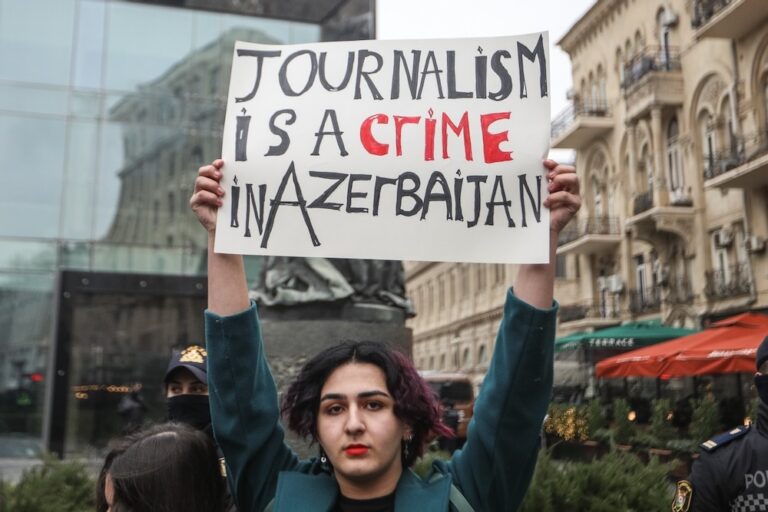Rafiq Tagi died after being stabbed by unknown assailants. IRFS believes that the delay in the investigation suggests that his death might have been in the interest of the authorities, as proof that the decriminalization of defamation in Azerbaijan might lead to negative consequences, such as the killing of journalists.
(IRFS/IFEX) – 23 November 2012 – IRFS condemns the Azerbaijani authorities for failing to seriously investigate prominent journalist and writer Rafiq Tagi’s murder and bring those responsible to justice despite the fact that one year has passed since his death. IRFS recalls that after he was brutally stabbed repeatedly one year ago, Tagi was hospitalized and died four days later after undergoing surgery. The anniversary of his death coincides with today’s International Day to End Impunity, which seeks to put a stop to crimes against freedom of expression.
On 19 November 2011, Tagi was attacked in the street near his home by an unknown assailant who stabbed him seven times. The 61 year-old appeared to be in recovery following surgery, but he then died on 23 November 2011 under suspicious circumstances. His death was initially attributed to choking; however the Ministry of Health later stated that the cause of death was peritonitis.
IRFS’ investigation into the murder yielded inconclusive results. However, the open nature of the attack makes it clear that Tagi’s attackers were fully confident of their impunity. Further, the failure of the prosecutor’s office to provide IRFS the information requested in five separate enquiries highlights the lack of transparency in the official investigation process.
The attack against Tagi was not the first time he had been targeted. Tagi had previously served more than a year in prison in 2007 on charges of inciting religious hatred stemming from an article he wrote which was critical of Islam. The authorities justified his arrest saying that it saved the journalist’s life; otherwise religious people might have killed him. Prior to his death, in an interview given in the hospital, Tagi suggested a recent article he had written criticizing the Iranian authorities could have been the cause for the attack against him.
IRFS believes that the delay in the investigation into Tagi’s murder suggests that his death might have been in the interest of the authorities, as proof that the decriminalization of defamation in Azerbaijan might lead to negative consequences, such as the killing of journalists.
Tagi’s murder was not an isolated incident, but a tragic example of a vicious ongoing cycle of violence against journalists and impunity for their attackers in Azerbaijan. In March 2005, Monitor magazine editor-in-chief Elmar Huseynov was murdered in an attack that bore the marks of organized crime. More than seven years later, the authorities have failed to identify or prosecute Huseynov’s murderers or the masterminds behind the attack.
Since Huseynov’s murder, there have been more than 200 violent attacks against journalists in Azerbaijan. In virtually none of these cases have the authorities undertaken serious investigations into the attacks and brought the true perpetrators to justice. This has resulted in a climate of complete impunity for those who wish to use violence to silence critical voices, and has contributed to the widespread self-censorship in the country.
IRFS calls on the Azerbaijani authorities to take immediate steps to put an end to this cycle of violence in accordance with their international obligations, including:
·Redoubling efforts to identify and bring to justice Ragiq Tagi and Elmar Huseynov’s murderers and the masterminds behind the attacks.
·Making public all information related to Tagi and Huseynov’s murders.
·Seriously investigating all cases of violence against journalists and bringing those responsible to justice.
·Fully investigating all threats against journalists and establishing effective protection mechanisms.
·Releasing the nine journalists and three human rights defenders who are currently in detention or in prison in connection with freedom of expression.


